Search the Special Collections and Archives Portal
Search Results
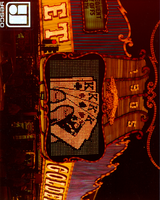
Photograph of the electronic marquee at the corner entrance of the Golden Nugget (Las Vegas), circa 1984
Date
Archival Collection
Description
Nighttime view of the exterior corner of the Golden Nugget, featuring a first generation, four-color electronic computerized display.
Site Name: Golden Nugget Las Vegas
Address: 129 East Fremont Street
Image
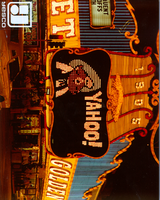
Photograph of the neon sign at the corner entrance of the Golden Nugget (Las Vegas), circa 1984
Date
Archival Collection
Description
Nighttime view of the exterior corner of the Golden Nugget, featuring a first generation, four-color electronic computerized display.
Site Name: Golden Nugget Las Vegas
Address: 129 East Fremont Street
Image
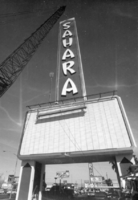
Photograph of assembly of the neon sign in front of the Sahara Hotel and Casino (Las Vegas), 1980
Date
Archival Collection
Description
Assembly of the Sahara Hotel and Casino neon sign, which at the time was the tallest free standing sign in the world.
Site Name: Sahara Hotel and Casino
Address: 2535 Las Vegas Boulevard South
Image
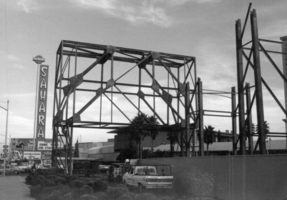
Photograph of structural framework in front the Sahara Hotel and Casino (Las Vegas), 1980
Date
Archival Collection
Description
Structural steel framework for the 1980 Sahara sign.
Site Name: Sahara Hotel and Casino
Address: 2535 Las Vegas Boulevard South
Image
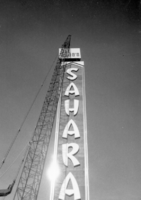
Photograph of the Sahara Hotel and Casino sign assembly (Las Vegas), 1980
Date
Archival Collection
Description
Crane placing the last section of the Sahara neon sign, which at the time was the tallest free standing sign in the world. The sign says 'Del Webb's Sahara.'
Site Name: Sahara Hotel and Casino
Address: 2535 Las Vegas Boulevard South
Image
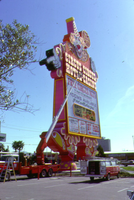
Photograph of work on the neon sign in front of Circus Circus (Las Vegas), 1980
Date
Archival Collection
Description
A worker in a basket crane puts the final touches on the Circus Circus neon sign.
Site Name: Circus Circus Las Vegas
Address: 2880 Las Vegas Boulevard South
Image
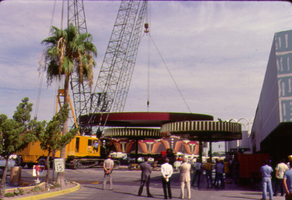
Photograph of men watching the assembly of the porte-cochère in front of the Sands Hotel (Las Vegas), 1967
Date
Archival Collection
Description
Assembly of the Sands Hotel porte-cochère.
Site Name: Sands Hotel
Address: 3355 Las Vegas Boulevard South
Image
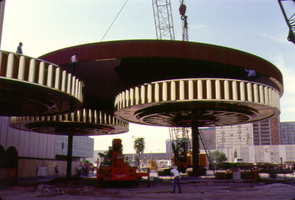
Photograph of the assembly of the porte-cochère in front of the Sands Hotel (Las Vegas), 1967
Date
Archival Collection
Description
Assembly of the Sands Hotel porte-cochère.
Site Name: Sands Hotel
Address: 3355 Las Vegas Boulevard South
Image

Photograph of a neon sign on the exterior of the Stardust Hotel and Casino (Las Vegas), 1969
Date
Archival Collection
Description
Nighttime view of a neon sign on the facade of the Stardust Hotel and Casino.
Site Name: Stardust Resort and Casino
Address: 3000 Las Vegas Boulevard South
Image

Photograph of the exterior corner of the Las Vegas Club (Las Vegas), circa 1980s
Date
Archival Collection
Description
Nighttime view of the exterior corner of the Las Vegas Club at Fremont and Main Streets. Part of the Mint can be seen to the right.
Site Name: Las Vegas Club
Address: 18 East Fremont Street
Image
